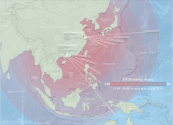Elimination of naval surface combatants is far easier than ground combat due to minimal-nonexistant terrain and greater effect of sensors and information flow
It is untrue: naval combat is conducted at far larger ranges and speeds. Uninvolved people perhaps don't understand how much everything is uncertain in peer warfare beyond the horizon. And, consequently, why surface capability for SAMs isn't a joke, and gun isn't just for male contests.
Targeting chains in naval warfare are long, uncertain, exploitable and desruptable. The fancier the chain(longer ranged) - the more desruptable.
Cost of a mistake is high, both in risk(firing = exposure) and mathematically (modern anti-ship munitions aren't endless).
Big question here is space (not that space brings now, but that it'll bring in a few years) - but precisely because we haven't seen a single war when space ISR was seriously disrupted - i think there's merit in being cautious here.
Space ISR is already quite foolable - yet no one has ever launched a shot at it. Yet.
and this works far more in China's favor than their potential opposition, especially since the Chinese position was always under targeting by said opposition in the first place.
Yet China currently is firmly on the pathway to building a surface navy second to none.
Isn't it a bit too much of an investment, if a few strategically deployed PrSM and NSM trucks will deny the whole thing?
That's the whole point - Korean(or allied) navy east of the peninsula operates in a more or less similar - or slightly more advantageous, - position to the PLAN.
ROKN itself is structurally more or less a downscaled PLAN* - and thus is quite comparable to one of PLAN's territorial fleets taken alone.
*For high-level planning purposes. Differences of course exist.

